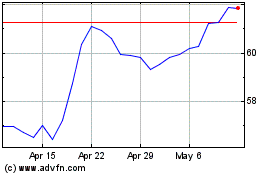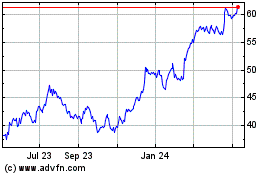Merrill Brokers Get Ultimatum: Refer New Customers or Face a Pay Cut -- Update
December 07 2016 - 4:52PM
Dow Jones News
By Michael Wursthorn
Merrill Lynch will require its brokers to make at least two
client referrals to other parts of parent Bank of America Corp.
next year to avoid a cut in pay, a move that comes as Wall Street
brokerages try to drum up new business while avoiding the type of
aggressive cross-selling tactics that shook Wells Fargo &
Co.
At Merrill, brokers who fail to refer at least two customers in
2017 to other parts of Bank of America -- including its online
brokerage platform Merrill Edge, its retail bank and other units --
will have 1% shaved from their take-home pay or deferred
compensation, depending on how much they produce in fees and
commissions, people with knowledge of the matter said. That is up
from one referral this year.
The change comes as rival Wells Fargo & Co. continues to
deal with the fallout from aggressive cross-selling practices that
led to the opening of as many as two million retail-banking and
credit-card accounts with fictitious or unauthorized information.
Wells Fargo in September agreed to pay a $185 million fine federal
and local regulators related to the cross-selling practices, though
it neither admitted nor denied any wrongdoing.
Merrill, however, requires its brokers only to make a referral
to another Bank of America unit, giving them credit regardless of
whether it generates new business -- a key distinction compared
with the incentives that were offered to retail bank employees at
Wells Fargo.
Two other big brokerages, Morgan Stanley and UBS Group AG, don't
have referral requirements on the books for 2017, although each
offers incentive bonuses to brokers to collect new assets. Wells
Fargo hasn't detailed its brokerage compensation plans for 2017
yet.
Merrill executives unveiled the changes to its more than 14,000
brokers on Tuesday and said they would leave unchanged in 2017 the
so-called pay grid, which accounts for the vast majority of a
broker's compensation by paying them a percentage of the fees and
commissions they generate.
"When you have a referral that goes across business lines, it's
always a tricky thing," said Alois Pirker, a research director at
Boston consulting firm Aite Group. "There is a fine line. As soon
as you put in place strong incentives and goals, you create
conflict."
Brokerages are likely to run into the problem further as they
attempt to position their brokers as advice givers and away from
stock pickers, an evolution that could gain pace if the Labor
Department's so-called fiduciary rule comes online in April as
currently planned. Instead of pitching a stock or bond, brokers are
encouraged to create financial plans, manage all aspects of a
client's balance sheet and recommend banking products.
Brokerage executives say they are requiring brokers to more
fully document recommendations they make to ensure they are in a
client's best interest and can be defended if legal action is
taken. The new fiduciary regulation requires brokers to work in the
best interest of retirement savers and requires brokers to keep
extensive records on why they recommended a specific product.
"Any cross-selling that is not done in the client's best
interest and whether the client actually needs the product, that's
when you cross that line," Mr. Pirker said. "Firms can't appear to
be drumming up business for the sake of meeting targets.
Brokers face other conflicts, too, analysts said. For instance,
Merrill, Morgan Stanley and others offer bonuses to brokers who
collect new assets or persuade clients to take out loans. Such
bonuses usually come in the form of deferred compensation, which
can consist of cash, stock or both, and can add several thousand
dollars to a broker's pay.
Morgan Stanley allegedly went a step further, according to a
complaint lodged by Massachusetts' top securities regulator in
October. Massachusetts alleged that Morgan Stanley offices in the
state and in Rhode Island ran an internal sales contest that gave
brokers as much as $5,000 for signing up new securities-backed
loans in 2014, while playing down risks associated with the
products.
Morgan Stanley has objected to the allegations and said clients
consented to the loans after discussing the products with brokers.
Morgan Stanley Chief Executive James Gorman told analysts on a
conference call in October that it wouldn't force the bank to
change its approach to how it offers those products.
Meanwhile, Merrill's compensation changes were welcomed by
brokers who had seen more-severe pay modifications in prior years,
the people said. For 2016, Merrill increased certain grid
thresholds that would have caused some Merrill brokers to lose 2%
to 8% of their base pay unless they increased the fees and
commissions they generated. Before that, Merrill cut how much
brokers were paid on accounts with less than $250,000 in assets to
encourage them to work with bigger clients.
Rival Morgan Stanley is making deeper changes to its broker
compensation next year. The bank told brokers last week it would
raise some compensation-grid thresholds it uses to pay brokers by
about 10% to encourage them to produce more revenue, as part of a
broader effort to rein in costs and generate more revenue.
UBS introduced its pay changes for 2017 in June. The Swiss bank
simplified its broker pay plan, increased cash payouts for teams
that generate $1 million or more in fees and commissions and cut
back the number of bonuses brokers can earn to focus on new assets
gained and length of service.
Write to Michael Wursthorn at Michael.Wursthorn@wsj.com
(END) Dow Jones Newswires
December 07, 2016 16:37 ET (21:37 GMT)
Copyright (c) 2016 Dow Jones & Company, Inc.
Wells Fargo (NYSE:WFC)
Historical Stock Chart
From Mar 2024 to Apr 2024

Wells Fargo (NYSE:WFC)
Historical Stock Chart
From Apr 2023 to Apr 2024
